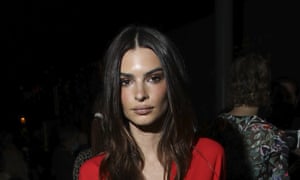Warning: this episode includes discussion of rape and sexual assault.
Emily Ratajkowski’s body was famous before she was. When she was cast as a dancer in the 2013 Blurred Lines video, her image was quickly associated with one of the most notorious and controversial songs of the decade – and just as quickly, her physique became an object of hypersexualised media scrutiny.
She went into that video as a jobbing model. She came out of it tasked with making sense of what this peculiar version of fame would mean – and with making a name for herself. Since then, she has been vilified and idealised, become one of the most sought after brand endorsements in the world, amassed an Instagram following of more than 28m, and established herself as an actor.
Throughout all of that, she has tried to come to terms with how the world sees her. Now she has carved out a new identity: writer. You might have already heard about her new book, My Body, because of the allegation that the singer Robin Thicke groped her on the set of the Blurred Lines video – but it’s about much more than that: how she uses her body to make money, how others have sought to use it for their own ends, how it carries the weight of her teenage traumas, and how it’s carried her son.
In this interview with Hannah Moore, Ratajkowski talks about the Thicke allegation, and how an attempt to sort the world into “good” and “bad” men is bound to fail. She explains how difficult the modelling industry made it to maintain a healthy relationship with her body. And she examines her complicated, ambivalent relationship to the culture that made her rich and famous – insisting: “Of course young girls want to gain power from how they look. It’s the way of taking control over something that’s going to happen one way or another.”
You can listen to a previous episode prompted by Ratajkowski’s essay, ‘Buying Myself Back’, here.
My Body by Emily Ratajkowski (Quercus) is out now. Order it at the Guardian bookshop.
• Information and support for anyone affected by rape or sexual abuse issues is available from the following organisations: In the UK, Rape Crisis offers support on 0808 802 9999. In the US, Rainn offers support on 800-656-4673. In Australia, support is available at 1800Respect (1800 737 732). Other international helplines can be found at ibiblio.org/rcip/internl.html

Photograph: Vianney Le Caer/Invision/AP
Support The Guardian
The Guardian is editorially independent.
And we want to keep our journalism open and accessible to all.
But we increasingly need our readers to fund our work.